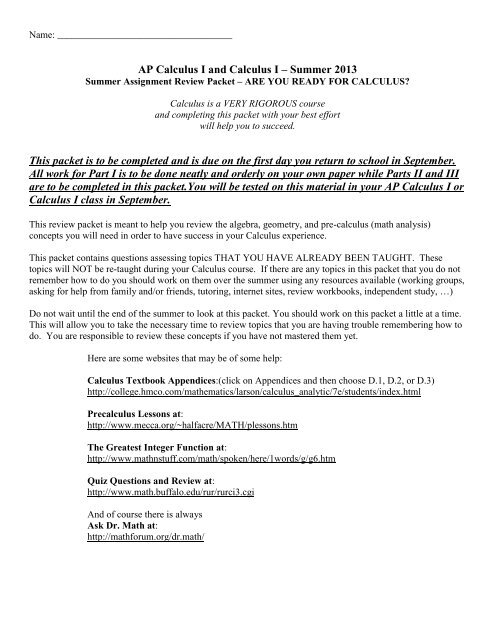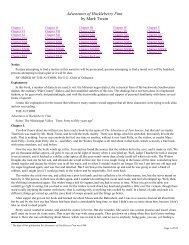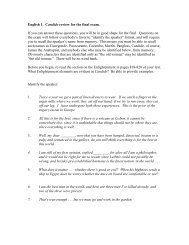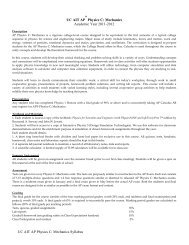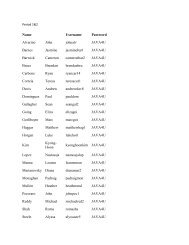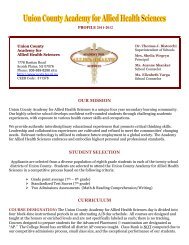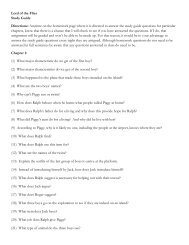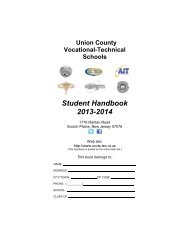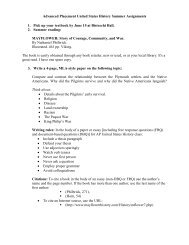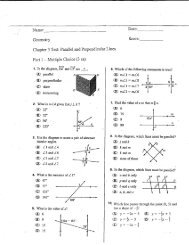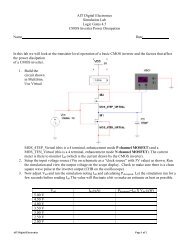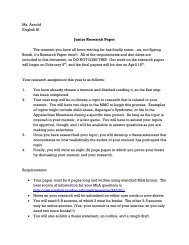2013 AP Calculus Summer Assignment
2013 AP Calculus Summer Assignment
2013 AP Calculus Summer Assignment
You also want an ePaper? Increase the reach of your titles
YUMPU automatically turns print PDFs into web optimized ePapers that Google loves.
Name: ____________________________________<br />
<strong>AP</strong> <strong>Calculus</strong> I and <strong>Calculus</strong> I – <strong>Summer</strong> <strong>2013</strong><br />
<strong>Summer</strong> <strong>Assignment</strong> Review Packet – ARE YOU READY FOR CALCULUS?<br />
<strong>Calculus</strong> is a VERY RIGOROUS course<br />
and completing this packet with your best effort<br />
will help you to succeed.<br />
This packet is to be completed and is due on the first day you return to school in September.<br />
All work for Part I is to be done neatly and orderly on your own paper while Parts II and III<br />
are to be completed in this packet.You will be tested on this material in your <strong>AP</strong> <strong>Calculus</strong> I or<br />
<strong>Calculus</strong> I class in September.<br />
This review packet is meant to help you review the algebra, geometry, and pre-calculus (math analysis)<br />
concepts you will need in order to have success in your <strong>Calculus</strong> experience.<br />
This packet contains questions assessing topics THAT YOU HAVE ALREADY BEEN TAUGHT. These<br />
topics will NOT be re-taught during your <strong>Calculus</strong> course. If there are any topics in this packet that you do not<br />
remember how to do you should work on them over the summer using any resources available (working groups,<br />
asking for help from family and/or friends, tutoring, internet sites, review workbooks, independent study, …)<br />
Do not wait until the end of the summer to look at this packet. You should work on this packet a little at a time.<br />
This will allow you to take the necessary time to review topics that you are having trouble remembering how to<br />
do. You are responsible to review these concepts if you have not mastered them yet.<br />
Here are some websites that may be of some help:<br />
<strong>Calculus</strong> Textbook Appendices:(click on Appendices and then choose D.1, D.2, or D.3)<br />
http://college.hmco.com/mathematics/larson/calculus_analytic/7e/students/index.html<br />
Precalculus Lessons at:<br />
http://www.mecca.org/~halfacre/MATH/plessons.htm<br />
The Greatest Integer Function at:<br />
http://www.mathnstuff.com/math/spoken/here/1words/g/g6.htm<br />
Quiz Questions and Review at:<br />
http://www.math.buffalo.edu/rur/rurci3.cgi<br />
And of course there is always<br />
Ask Dr. Math at:<br />
http://mathforum.org/dr.math/
Note: Except for # 34 and 38 calculator use is NOT permitted to solve any of the problems.<br />
Part I<br />
1. Simplify: (a)<br />
f ( x)<br />
3<br />
x 9x<br />
2<br />
x 7x<br />
12<br />
(b)<br />
2<br />
x 2x<br />
8<br />
3 2<br />
x x 2x<br />
(c)<br />
1 1<br />
<br />
x 5<br />
1 1<br />
<br />
2<br />
x 25<br />
(d)<br />
9 x<br />
3 x<br />
2<br />
1<br />
2. Rationalize the denominator: (a)<br />
2<br />
3 2<br />
(b)<br />
4<br />
1<br />
5<br />
(c)<br />
1<br />
1<br />
3 5<br />
3. Write each of the following expressions in the form c a p b q where c, p and q are numbers:<br />
(a)<br />
<br />
2<br />
b<br />
<br />
2<br />
a 3<br />
(b)<br />
3<br />
9ab<br />
(c)<br />
<br />
a 2<br />
b<br />
3<br />
b<br />
<br />
(d)<br />
ab a<br />
2<br />
b b<br />
(e)<br />
1<br />
a<br />
1<br />
b a<br />
<br />
(f)<br />
<br />
a<br />
<br />
b<br />
2<br />
3<br />
1<br />
2<br />
2<br />
<br />
b<br />
<br />
a<br />
3<br />
2<br />
1<br />
2<br />
<br />
<br />
<br />
<br />
4. Solve for x (do not use a calculator):<br />
(a) 5 (x + 1) = 25<br />
(b)<br />
1<br />
3 2 x 2<br />
3<br />
(c) log 2 x = 3 (d) log 3 x 2 = 2 log 3 4 - 4 log 3 5<br />
5. Simplify: (a) log 2 5 + log 2 (x 2 - 1) - log 2 (x - 1) (b) 2 log 4 9 - log 2 3 (c) 3 2 5<br />
log 3<br />
6. Simplify: (a)<br />
log 1<br />
2<br />
10 10 <br />
<br />
<br />
(b)<br />
1<br />
log 10 <br />
10<br />
x<br />
<br />
<br />
<br />
log<br />
x <br />
(c) 2 3<br />
log<br />
10 10<br />
x<br />
1 3<br />
7. Solve the following equations for the indicated variables.<br />
(a) x y z<br />
(b) V = 2 (ab + bc + ca), for a<br />
1, for a<br />
a b c<br />
2<br />
(c) A 2r 2 rh, for r (d) A = P + nrP, for P<br />
(e) 2x - 2yd = y + xd, for d (f) 2 x 1 x<br />
0<br />
4 , for x<br />
2<br />
“ARE YOU READY FOR CALCULUS ?”<br />
taken and modified from the website http://www.math.unb.ca<br />
most answers can be found at: http://www.math.unb.ca/ready/answers.pdf
8. For the equations<br />
(a) y = x 2 + 4x +3 (b) 3x 2 + 3x + 2y = 0 (c) 9y 2 - 6y - 9 - x = 0<br />
complete the square and reduce to one of the standard forms<br />
y - b = A(x - a) 2 or x - a = A(y - b) 2 .<br />
9. Factor completely: (a) x 6 - 16x 4 (b) 4x 3 - 8x 2 - 25x + 50 (c) 8x 3 + 27 (d) x 4 -1<br />
10. Find all real solutions to:<br />
(a) x 6 - 16x 4 = 0 (b) 27x 3 - 64 = 0<br />
(c)<br />
25x<br />
8x<br />
2<br />
4x<br />
3<br />
50<br />
(d)<br />
x<br />
3<br />
x<br />
2<br />
13x<br />
3<br />
0<br />
11. Solve for x:<br />
(a)<br />
3sin 2 x cos 2 x;<br />
0 x 2<br />
(b) cos sin sin ;<br />
x x x - x <br />
2 2<br />
(c) tan sec cos ;<br />
x x 2 x x <br />
12. Without using a calculator, evaluate the following:<br />
(a) cos 210°<br />
(e) cos 9 <br />
4<br />
(b)<br />
(f)<br />
sin 5 <br />
4<br />
sin 1 3<br />
2<br />
(c) tan -1 (-1)<br />
(g) tan 7 <br />
6<br />
(d) sin-1 (-1)<br />
(h) cos -1 (-1)<br />
13.)<br />
Given the graph of sin x, sketch the graphs of:<br />
(a)<br />
<br />
sin<br />
x<br />
<br />
(d) cos x<br />
<br />
4 <br />
<br />
(b) sin x <br />
2 <br />
1<br />
(e)<br />
sin x<br />
(c) 2 sin x<br />
“ARE YOU READY FOR CALCULUS ?”<br />
taken and modified from the website http://www.math.unb.ca<br />
most answers can be found at: http://www.math.unb.ca/ready/answers.pdf
14. Solve the equations: (a) 4x 2 5<br />
+ 12x + 3 = 0 (b) 2x<br />
1 x 2<br />
(c) x 1 x x 0<br />
x 1<br />
15. Find the remainders on division of<br />
(a) x 5 - 4x 4 + x 3 - 7x + 1 by x + 2 (b) x 5 - x 4 + x 3 + 2x 2 - x + 4 by x 3 + 1<br />
16. (a) The equation 12x 3 - 23x 2 - 3x + 2 = 0 has a solution x = 2. Find all other solutions.<br />
(b) Solve for x, the equation 12x 3 + 8x 2 - x - 1 = 0.<br />
(All solutions are rational and between ±1.)<br />
17. Solve the inequalities: (a) x x<br />
2<br />
2 3 0<br />
(b)<br />
2x<br />
1<br />
1<br />
3x<br />
2<br />
<br />
(c) x x<br />
2<br />
<br />
1<br />
0<br />
18. Solve for x: (a)<br />
x 4 1 (b) | 5x - 2 | = 8 (c) | 2x + 1 | = x + 3<br />
19. Determine the equations of the following lines:<br />
(a) the line through (-1,3) and (2,-4);<br />
(b) the line through (-1,2) and perpendicular to the line 2x - 3y + 5 = 0;<br />
(c) the line through (2,3) and the midpoint of the line segment from (-1,4) to (3,2).<br />
20. (a) Find the point of intersection of the lines: 3x - y - 7 = 0 and x + 5y + 3 = 0.<br />
(b) Shade the region in the xy-plane that is described by the system of inequalities.<br />
3x<br />
y 7 0<br />
x 5y<br />
3 0<br />
21. Find the equations of the following circles:<br />
(a) the circle with centre at (1,2) that passes through the point (-2,-1);<br />
(b) the circle that passes through the origin and has intercepts equal to 1 and 2 on the x- and y- axes,<br />
respectively.<br />
“ARE YOU READY FOR CALCULUS ?”<br />
taken and modified from the website http://www.math.unb.ca<br />
most answers can be found at: http://www.math.unb.ca/ready/answers.pdf
22. For the circle x 2 + y 2 + 6x - 4y + 3 = 0, find:<br />
(a) the centre and radius; (b) the equation of the tangent at (-2,5).<br />
23. A circle is tangent to the y-axis at y = 3 and has one x-intercept at x = 1.<br />
(a) Determine the other x-intercept. (b) Write the equation of the circle.<br />
24. A curve is traced by a point P(x,y) which moves such that its distance from the point<br />
A(-1,1) is three times its distance from the point B(2,-1). Determine the equation of the curve.<br />
25. (a) Find the domain of the function<br />
f ( x) <br />
x<br />
3x<br />
1<br />
2<br />
x 2<br />
(b) Find the domain and range of the functions: i)<br />
f ( x) 7 ii) g x<br />
5x<br />
3<br />
( ) <br />
2x<br />
1<br />
x<br />
26. Let f ( x) , show that<br />
x<br />
Then, find the domain and range of<br />
1, x 0<br />
f ( x)<br />
<br />
1,<br />
x 0<br />
f ( x)<br />
.<br />
27. Simplify<br />
f ( x h) f ( x)<br />
h<br />
, where<br />
(a)<br />
f ( x) 2x<br />
3 (b)<br />
1<br />
f ( x) <br />
x 1<br />
(c)<br />
f ( x) x<br />
2<br />
28.) The graph of the function y f ( x)is given as follows:<br />
Determine the graphs of the functions:<br />
(a) f ( x 1 )<br />
(b)<br />
f<br />
( x)<br />
(c)<br />
f ( x)<br />
(d)<br />
f<br />
( x )<br />
“ARE YOU READY FOR CALCULUS ?”<br />
taken and modified from the website http://www.math.unb.ca<br />
most answers can be found at: http://www.math.unb.ca/ready/answers.pdf
29. Sketch the graphs of the functions: (a) g x x<br />
( ) 3 2<br />
(b) h ( x)<br />
xx<br />
1<br />
30.<br />
(a) The graph of a quadratic function (a parabola) has x-intercepts -1 and 3 and a range consisting of all<br />
numbers less than or equal to 4. Determine an expression for the function.<br />
(b) Sketch the graph of the quadratic function y = 2x 2 - 4x + 3.<br />
31. Find the inverse of the functions:<br />
(a)<br />
f ( x) 2x<br />
3 (b)<br />
x 2<br />
f ( x) <br />
5x<br />
1<br />
2<br />
(c) f ( x) x 2x 1,<br />
x 0<br />
32.<br />
A function<br />
f ( x)<br />
has the graph to the right.<br />
Sketch the graph of the inverse function<br />
“ARE YOU READY FOR CALCULUS ?”<br />
taken and modified from the website http://www.math.unb.ca<br />
most answers can be found at: http://www.math.unb.ca/ready/answers.pdf
33.<br />
Express x in terms of the other variables in the picture.<br />
34.)(a) Find the ratio of the area inside the square but outside the circle to the area of the square in the<br />
picture (a) below.<br />
(b)<br />
(c)<br />
(d)<br />
(e)<br />
Find a formula for the perimeter of a window of the shape in the picture (b) above.<br />
A water tank has the shape of a cone (like an ice cream cone without ice cream). The tank is 10m<br />
high and has a radius of 3m at the top. If the water is 5m deep (in the middle) what is the surface<br />
area of the top of the water?<br />
Two cars start moving from the same point. One travels south at 100km/hour, the other west at<br />
50 km/hour. How far apart are they two hours later?<br />
A kite is 100m above the ground. If there are 200m of string out, what is the angle between the<br />
string and the horizontal. (Assume that the string is perfectly straight.)<br />
“ARE YOU READY FOR CALCULUS ?”<br />
taken and modified from the website http://www.math.unb.ca<br />
most answers can be found at: http://www.math.unb.ca/ready/answers.pdf
35. Using the trig identities:<br />
(a) Show that<br />
sin<br />
cos<br />
<br />
1 cos<br />
sin<br />
can be simplified to csc<br />
(b) Rewrite<br />
1<br />
1 sin x<br />
so that it is not in fractional form.<br />
(c) Show that<br />
2<br />
sec 1<br />
2<br />
sec<br />
can be simplified to sin 2 <br />
36. Use Binomial Theorem Expansion (do NOT use repeated multiplication) to expand the following:<br />
(a) (x – 2) 4 (b) (3x - 2y) 6 (c) (<br />
1<br />
u<br />
+ 3b) 10<br />
37. Determine the right-hand and left-hand behavior of the graph of:<br />
(a)<br />
f ( x)<br />
1<br />
2x<br />
x<br />
6<br />
(b)<br />
f ( x)<br />
2.1x<br />
5<br />
4x<br />
3<br />
2x<br />
2<br />
1<br />
38.<br />
38. Use the Intermediate Value Theorem and a graphing calculator (or a sketch of the graph) to find<br />
intervals of length one in which the polynomial is guaranteed to have a zero.<br />
3 2<br />
4 2<br />
(a) f ( x)<br />
x 3x<br />
3 (b) f ( x)<br />
x 10x<br />
3<br />
39. Two planes start from the same airport and fly in opposite directions. The second plane starts one-half<br />
hour after the first plane, but its speed is 80 kilometers per hour faster. Find the air speed of each plane if 2<br />
hours after the first plane departs the planes are 3200 kilometers apart.<br />
4 24<br />
40. The path of a diver is given by y x 2 x 12 where y is the height in feet and x is the horizontal<br />
9 9<br />
distance from the end of the diving board in feet. What is the maximum height of the dive?<br />
“ARE YOU READY FOR CALCULUS ?”<br />
taken and modified from the website http://www.math.unb.ca<br />
most answers can be found at: http://www.math.unb.ca/ready/answers.pdf
Part II<br />
Graphical Analysis – Much of <strong>Calculus</strong> deals with functions and their graphical characteristics. To facilitate the<br />
study of functions, it is important that you be able to quickly sketch the graph of a basic function or a<br />
transformation of a basic function without a calculator.<br />
Without using a calculator, graph each function below. As always, it is necessary to indicate the units and<br />
label the axes provided. Full credit will not be earned without units and axes completely labeled.<br />
f ( x)<br />
x<br />
2<br />
1<br />
f ( x)<br />
x 2 2<br />
2<br />
x <br />
2<br />
y<br />
f<br />
( x)<br />
x<br />
3<br />
f ( x)<br />
( x 1)<br />
3<br />
f<br />
( x)<br />
<br />
1<br />
x<br />
f ( x)<br />
sin x<br />
f ( x)<br />
cos x<br />
f ( x)<br />
tan x
f ( x)<br />
csc x<br />
f ( x)<br />
sec x<br />
f ( x)<br />
cot<br />
x<br />
f ( x)<br />
2<br />
x<br />
f<br />
x<br />
( x)<br />
e<br />
f ( x)<br />
ln x<br />
f ( x)<br />
<br />
<br />
x<br />
(Greatest integer function)<br />
f<br />
( x)<br />
<br />
x<br />
f<br />
( x)<br />
<br />
x
Part III<br />
FILL IN THE TABLE BELOW. You may use the following abbreviations:<br />
R - the set of real numbers, Z - the set of integers, and N - the set of natural numbers.<br />
FUNCTION DOMAIN RANGE X-INTERCEPTS Y-INTERCEPTS<br />
f ( x)<br />
x<br />
2<br />
1<br />
f ( x)<br />
x 2 2<br />
2<br />
x <br />
y<br />
2<br />
f ( x)<br />
x<br />
3<br />
f ( x)<br />
( x 1)<br />
1<br />
f ( x)<br />
<br />
x<br />
f ( x)<br />
sin x<br />
f ( x)<br />
cos x<br />
f ( x)<br />
tan x<br />
f ( x)<br />
csc x<br />
f ( x)<br />
sec x<br />
f ( x)<br />
cot x<br />
f ( x)<br />
2<br />
f ( x)<br />
e<br />
x<br />
x<br />
f ( x)<br />
ln x<br />
f ( x)<br />
<br />
f ( x)<br />
<br />
f ( x)<br />
<br />
x<br />
x<br />
x<br />
3<br />
ODD OR<br />
EVEN<br />
SYMMETRY?


